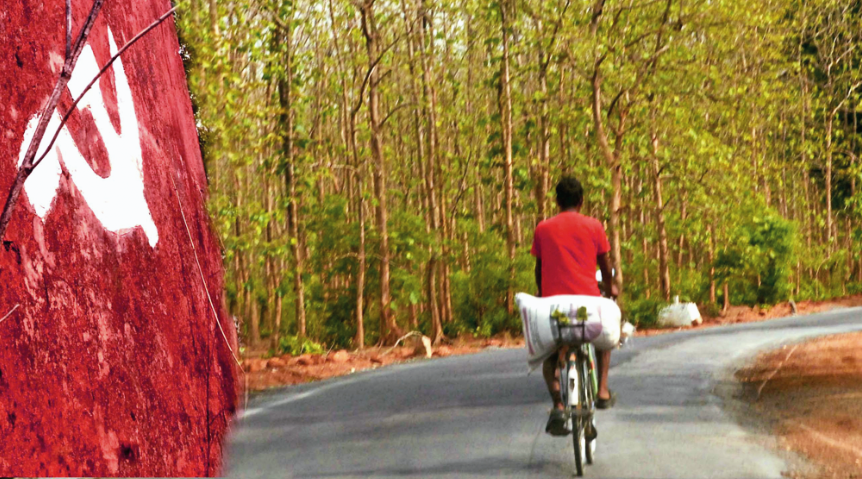Tribals are the poorest, most oppressed community. Maoists say revolution is the only way forward for them. That’s dead wrong.
Last month I visited Dediapada taluka, Gujarat. Every tribal village there has tractors, hundreds of villagers have motorcycles, and the gram panchayats have crores in the bank. It is a heart-warming tale of empowerment.
Since large forest areas were nationalized in colonial times, tribals have been treated by forest departments as encroachers in their own homelands. This changed with the Forest Rights Act, which granted tribals title to land they were cultivating in 2006. The forest departments own all timber in forests, but tribals have rights over minor produce, including grass. They also have the right to manage community forests.
Implementation in Dediapada was initially terrible: 90% of tribal title applications were rejected. ARCH Vahini, a local NGO led by Anil Patel and Ambrish Mehta, took the matter to court. The court allowed a wide range of documents, including satellite photos, to be used to establish title.
ARCH Vahini started using GPS devices for mapping. Each villager walks with a GPS device to the edge of his field and presses a button. He then walks round the perimeter of his field and presses another button. The device immediate draws an exact map of the field, which can be downloaded into computers and printed. The maps of all villagers are fitted together like a jigsaw puzzle and superimposed on a satellite map of the village taken in 2006, establishing plot ownership at the time. This has greatly improved the official acceptance rate, though titling is still incomplete.
I first visited the taluka in 2013 and asked the villagers what they would gain from legal title. They said it would force the forest department to permit the entry of tractors into their villages, something forbidden till then. They had no desire to stick to living self-sufficient lives in the jungle, as desired by some ideologues. Tribals wanted the good things of life enjoyed by mainstream folk.
When I visited the taluka last month, much had changed. The Supreme Court had held that bamboo was a grass, not a tree. This meant that forest bamboo belonged to the tribals, not the forest department.
In Dediapada, many bamboo groves had flowered after 2009. Bamboo dies after flowering, so vast amounts of dead, dry bamboo littered the forest floor, becoming a major fire hazard. This convinced the forest department of the urgency of allowing tribals to assert their new ownership rights.
JK Paper Mills, which once got bamboo from the forest department, was earlier seen as a foe of tribals, robbing them of access to bamboo. But now the gram sabhas, aided by NGOs, negotiated a price of Rs 2,815 per tonne with the mill for fallen bamboo delivered to the roadside for trucks to lift. Between April 2014 and June 2015, the mill lifted 96,000 tonnes of bamboo. Wages paid totalled a whopping Rs 12 crore, and the net profit of gram sabhas after all expenses was Rs 6.5 crore.
This was a huge income for the 2,500 households in the target villages. At a meeting in the bamboo forest I attended, one-third of the villagers came on motorcycles, bought with the high wages they had earned. Most said they now owned TVs and cellphones. All but two wore shirts and trousers, abandoning the old ganji-dhoti.
They said the gram sabhas were keeping the profits in bank fixed deposits till their future use was decided. A good chunk will go to soil and forest conservation, planting bamboo in degraded forests, replanting bamboo in the dead areas, and creating vegetation-free fire lines to stop the spread of forest fires.
Hurdles keep appearing. A new divisional forest officer (DFO) refuses to allow more bamboo out of the forest, possibly because a lot lies in a sanctuary. Lawyers say the FRA provides tribal rights even in sanctuaries. If the DFO remains adamant, the gram sabhas plan to go to court.
JK Mills provided five lakh free bamboo saplings last year and will provide another 10 lakh this year. The former foe has now become a friendly client. The villagers have stopped all grazing in the newly planted areas to protect saplings. The new crop will be cut after four years. Being quality green bamboo, it will fetch a much higher price of Rs 4,000 per tonne.
In effect, once-impoverished and powerless villagers have become plantation owners with a regular, substantial income. They are managing the bamboo forests productively. Despite hurdles, this is a social and economic revolution.
This holds lessons for tribals in other states. They too should be given bamboo forests to manage, and become plantation owners. That will surely end jungle Maoism.



Cherishing story, Bharat unveiling.